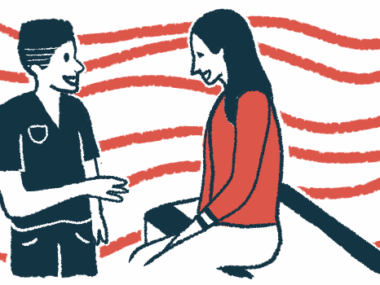What does it mean to be brave?
As rare disease statistics go, my case of aHUS is unusually rare
Written by |

“You’re so brave.”
I’ve been told this numerous times. I have a good friend who says it to me often. But how does one define bravery?
When I think of bravery I think of someone fighting to right an injustice. Fighting for someone who can’t defend themselves. Or standing up to great oppression. Not me.
One fact is true: My life completely changed after I nearly died in September 2020. I was in the ICU for nearly two months with multiorgan failure when a bout of symptomless COVID-19 activated a rare disease in my body called atypical hemolytic uremic syndrome (aHUS).
By the time I finally sought medical care, it was a life-or-death situation. I endured 18 blood transfusions, dialysis, plasmapheresis, antibody therapy, several biopsies, and tons of bloodwork and other tests.
Over the past two and a half years, I’ve been through five months of dialysis, lifetime maintenance antibody therapy, a hysterectomy, roughly 10-dozen blood draws, a liver hematoma, dozens of doctor appointments, and a lot of additional tests and exams.
OK, yes, it’s a lot. But I can’t help but feel a little bit of impostor syndrome. I can walk, I’m not currently in the hospital, I can eat a lot of what I want to now, I can shop and stand and do things that a lot of less fortunate people can’t do. So sometimes I feel silly complaining about my daily struggles.
Yes, I’ve endured a lot, but does that make me brave?
What I needed to do
My lead nephrologist said I was dying, and of my many symptoms, the most urgent was the damage to my kidneys. So doctors told me I would have surgery and start dialysis. Then they said my red blood cells were hemolyzing, a condition called hemolytic anemia. So they told me I would be given blood transfusions. They said my entire body was in danger from my damaged kidneys, so I’d need to start a renal diet and could only drink water.
There’s a whole list of things I was told would happen and that had to be done. The point is I was told what was going to happen. I had little or no say about what needed to be done to my body in order to live. The choice was clear: If I wanted to ever walk out of that hospital, then these were the things that I needed to do.
Following necessary medical treatment in order to live is not what I would call brave. I wanted to live! Plain and simple. So I can’t help but think that I’m not this brave soul that people think I am.
But I do like to think that it’s brave to be open and honest about my disease. It’s so important to connect patients and caregivers who are affected by aHUS, and to bring awareness to aHUS and other rare diseases.
Bravery might be in the eye of the beholder, whether it’s perseverance, transparency, fearlessness, or simply the will to continue on. Bravery can be a lot of things. And if appearing to be brave helps anyone else’s outlook on life, then I’m all for it.
Note: aHUS News is strictly a news and information website about the disease. It does not provide medical advice, diagnosis, or treatment. This content is not intended to be a substitute for professional medical advice, diagnosis, or treatment. Always seek the advice of your physician or other qualified health provider with any questions you may have regarding a medical condition. Never disregard professional medical advice or delay in seeking it because of something you have read on this website. The opinions expressed in this column are not those of aHUS News or its parent company, Bionews, and are intended to spark discussion about issues pertaining to aHUS.







Leave a comment
Fill in the required fields to post. Your email address will not be published.